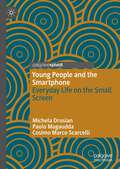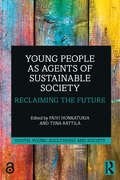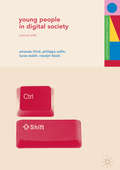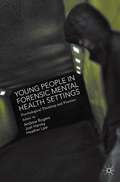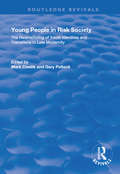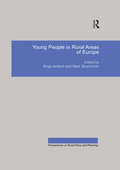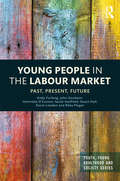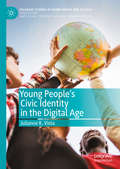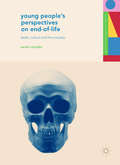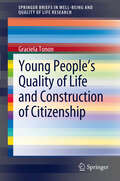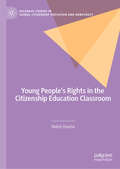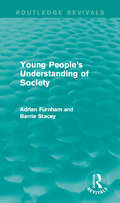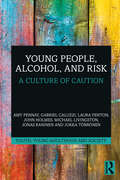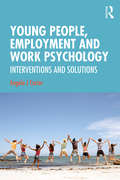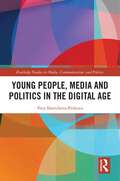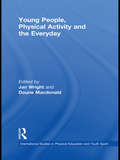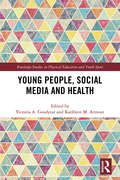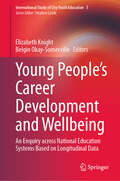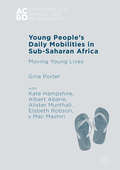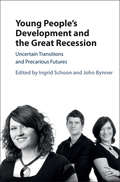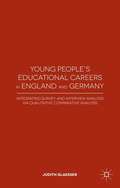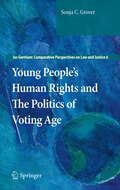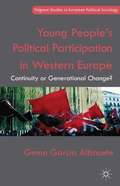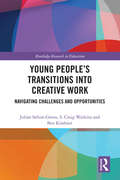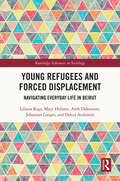- Table View
- List View
Young People and the Smartphone: Everyday Life on the Small Screen
by Paolo Magaudda Cosimo Marco Scarcelli Michela DrusianIn recent years, smartphones and digital platforms have become essential to our lives and are now inextricably interwoven into the everyday practices of millions, especially young people. Focusing on smartphone practices and experiences of youth today, this volume is the result of empirical research based on focus groups and in-depth interviews with young people aged 18-30. Grounded in media theory and analyzed through a blended lens of media and science and technology studies, the book offers detailed and fascinating insights into the everyday use of smartphones. Topics covered include the role of the smartphone as material technology, its use in interpersonal relationships, photographic practices, music and consumer practices, along with the deconstruction of the notion of smartphone ‘addiction’.
Young People as Agents of Sustainable Society: Reclaiming the Future (Youth, Young Adulthood and Society)
by Päivi Honkatukia Tiina RättiläThis book analyses young people’s societal participation as a central dimension of their well-being and as vitally important to secure the sustainable future of humankind and the whole eco-social system. It develops a theoretical framework for analysing youth participation holistically, embedded in its everyday context, and as a relational phenomenon, underpinned by universal human needs. It introduces innovative methodological approaches to study youth engagements in society. This book will appeal to scholars and students of youth studies, sociology, sustainable development, youth participation and education. It also offers new knowledge and theoretical readings for policy experts on youth and sustainable development, as well as for NGOs working with youth. The Open Access version of this book, available at http://www.taylorfrancis.com, has been made available under a Creative Commons Attribution-Non Commercial-No Derivatives (CC-BY-NC-ND) 4.0 license.
Young People in Digital Society: Control Shift (Studies in Childhood and Youth)
by Philippa Collin Amanda Third Lucas Walsh Rosalyn BlackThis book adopts a critical youth studies approach and theorizes the digital as a key feature of the everyday to analyse how ideas about youth and cyber-safety, digital inclusion and citizenship are mobilized. Despite a growing interest in the benefits and opportunities for young people online, both ‘young people’ and ‘the digital’ continue to be constructed primarily as sites of social and cultural anxiety requiring containment and control. Juxtaposing public policy, popular educational and parental framings of young people’s digital practices with the insights from fieldwork conducted with young Australians aged 12–25, the book highlights the generative possibilities of attending to intergenerational tensions. In doing so, the authors show how a shift beyond the paradigm of control opens up towards a deeper understanding of the capacities that are generated in and through digital life for young and old alike. Young People in Digital Society will be of interest to scholars and students in youth studies, cultural studies, sociology, education, and media and communications.
Young People in Forensic Mental Health Settings: Psychological Thinking and Practice
by Joel Harvey Andrew Rogers Heather LawYouth crime and youth violence blights our communities and shapes the lives of many, whether they are victims, perpetrators or family members. This book examines the application of psychological thinking and practice when working with young people who display high risk behaviours across a broad range of forensic mental health settings in the UK. It provides an up-to-date account of current thinking and practice in the field and the challenges of applying effective psychological approaches within forensic settings for young people. The contributors to Young People in Forensic Mental Health Settings are drawn from a range of environments including universities, youth offending services, secure in-patient settings, young offender institutions, Community Forensic Child and Adolescent Mental Health Services (F-CAMHS), and secure children's homes. This volume serves as an important platform for debate and as a forum for discussing the future delivery of psychologically informed services, intervention and mental health provision with young people who display high-risk behaviours.
Young People in Risk Society: The Restructuring of Youth Identities and Transitions in Late Modernity (Routledge Revivals)
by Mark Cieslik Gary PollockThis title was first published in 2002: Loosely divided into two sections, this book's first part includes chapters which explore young people's identities and youth cultures in relation to issues such as drug use, education and dance music. In various ways, the authors examine whether there is a need to rethink the existing theories and concepts which have informed the study of youth cultures and identities. The second part to the volume is concerned with how young people experience "transtitions", in relation to such topics as employment, sexuality, and household formation. The chapters also raise theoretical questions on the usefulness of the transition concept in late modernity, illustrating how the reshaping of key institutions in late modernity has had a profound effect on the sorts of transitions young people make today. In addressing such issues the authors examine the potential contribution that concepts around risk and risk society and new Third Way social policy initiatives can have to contemporary youth studies.
Young People in Rural Areas of Europe (Perspectives on Rural Policy and Planning)
by Birgit JentschDespite an EU-wide commitment to rural development, research has rarely focused on the lives of young people in rural areas, their experiences in education and employment, their perceptions of policies relevant to them, and their possibilities of participation. Based on a two-year European research project on policies and young people in rural development, this edited volume examines these issues and considers young people's experiences of rural life in Austria, Finland, France, Germany, Ireland, Portugal and Scotland. The volume is organized thematically with each chapter addressing a specific topic in one or more countries. These topics comprise: the attractiveness of rural areas to young people; the impact of programmes under the European Employment Guidelines; rural youth in local community development and partnerships; rural development programmes and their impact on youth integration; the role of social networks; and the transition from education to employment. A number of implications for policy and practice are drawn out in conclusion. This book will be of interest to anyone concerned with the future of rural areas and with those who live in the European countryside.
Young People in the Labour Market: Past, Present, Future (Youth, Young Adulthood and Society)
by Stuart Hall Kevin Lowden John Goodwin Andy Furlong Henrietta O'Connor Sarah Hadfield Réka PlugorLevels of suffering among young people have always been much higher than governments suggest. Indeed, policies aimed at young workers have often been framed in ways that help secure conformity to a new employment landscape in which traditional securities have been progressively removed. Increasingly punitive welfare regimes have resulted in new hardships, especially among young women and those living in depressed labour markets. Framed by the ideas of Norbert Elias, Young People in the Labour Market challenges the idea that changing economic landscapes have given birth to a ‘Precariat’ and argues that labour insecurity is more deep-rooted and complex than others have suggested. Focusing on young people and the ways in which their working lives have changed between the 1980s recession and the Great Recession of 2008/2009 and its immediate aftermath, the book begins by drawing attention to trends already emerging in the preceding two decades. Drawing on data originally collected during the 1980s recession and comparing it to contemporary data drawn from the UK Household Longitudinal Study, the book explores the ways in which young people have adjusted to the changes, arguing that life satisfaction and optimism are linked to labour market conditions. A timely volume, this book will be of interest to undergraduate and postgraduate students, as well as postdoctoral researchers who are interested in fields such as Sociology, Social Policy, Management and Youth Studies.
Young People's Civic Identity in the Digital Age (Palgrave Studies in Young People and Politics)
by Julianne K. ViolaThis book explores young people’s civic experiences in contemporary American society, and how they navigate the political world in an era defined by digital media. Drawing on the experiences of young people before they have reached voting age, the book provides vital perspectives on citizenship and civic engagement of a part of the population that is often overlooked. The author engages with the tensions young people encounter in their everyday personal and civic lives, particularly in their understanding and experience of civic identity in ways that are shaped by society’s (mis)perceptions of youth. The book introduces a new framework of civic identity that has been directly informed by the lived civic experiences of young people themselves. The findings will be of great interest to researchers and students working in political science, sociology, youth studies, education studies, and media studies, as well as policy-makers, practitioners, and parents of young people.
Young People's Perspectives on End-of-Life
by Sarah CoombsThis book challenges adult assumptions that young-people do not, cannot and should not think about death. The author uses everyday material objects in order to facilitate a range of conversations, revealing lively engagement with the topic. Cultural resources, such as literature and film, provide a rich variety of perspectives on and responses to death, whilst equally providing an opportunity to challenge many of these representations as unreal and unauthentic. The book contains personal narratives of loss and memories of loved ones, presenting a variety of encounters with significant deaths, the stories being told in an array of vibrant, amusing and emotive ways. Similarly, death is explored from a variety of religious and scientific frameworks, highlighting rich and changing perspectives. Such shifting and exciting vistas are a largely undiscovered part of young-people's lives and situate them in a landscape not often associated with childhood. Young-People's Perspectives on End-of-Life will be of interest to students and scholars across a range of disciplines, including Childhood and Youth Studies, Death Studies, Qualitative Research Methodologies, Sociology, Anthropology and Education.
Young People's Quality of Life and Construction of Citizenship
by Graciela TononThe study of quality of life refers to the material environment (social welfare) and psychosocial environment (wellbeing). It has been defined as a concept that implies the objective and subjective dimension that Cummins (1997) first studied in seven domains. The use of domains in the quality of life study allows a more precise measurement than the one that could have been reached through simple questions, since psychometric scales are used and if the addition of domains is equivalent to the totality of life satisfaction, then the group of domains is a valid measure of quality of life. In the case of young people, it has been observed that even if they live in negative physical, social and contextual conditions, they can nevertheless experience a relatively positive experience in relation to their quality of life, depending on the strategies and capabilities that they generate in relation to the context. Similarly, young people that live in favorable socioeconomic conditions and with a trouble free psychological situation may experience a relatively poor evaluation of their position in life (Patrick et al). oung people do not form a homogenous group and, in this sense, it is not possible to generalize about youth; they interact with the environment in which they live and they are a product of the history they happen to live, in this way they transit different vital scenarios in daily life that affect their quality of life. The social representations about youth that each population has, in each historical moment, are embedded in the social context in which young people live and develop, conditioning every-day life and /or creating related stereotypes. The concept of youth is a social construction built conjointly by all members of society in the historical moment in which they live. Young people interact with the environment in which they live and they are a product of the history they happen to live. Authors like Urresti (1999) define youth from a point of view that takes into account the living together of different generations in different societies, thus being impossible to compare young people of today with those of two or three decades ago; in addition, he states that it is necessary to situate the understanding of youth within the historical and social moment in which they live. Nowadays the predominant adult model is based in individualism, and even if an intergenerational dialogue is necessary, it is difficult for young people to achieve this kind of communication with adults that, in some cases, are living "stages of youth" or that need to be "forever young". Young people live in uncertainty, with a limited perspective for future action, assigning their own meaning to events and facts, according to their fundamental concerns that are significantly different from those of their parents' generation. In the other side the process of globalization and the protagonist social role of the new informational and communicational technologies, produce that the possibilities to expand individual freedoms increase, but not all young people can manage with it (Lechner, 2002). What young people need in order to construct their citizenship and feel satisfied, varies according to the different societies, especially considering that most of them live a fragile situation. As Cortina (2003:7-9) states, the idea of citizenship always transcends individualism, because the citizen is somebody that exists together with others, and those others are equal to him before the city, is somebody that deliberates with others, that acts with others conjointly, that assumes the protagonist role of his own life, in this way citizen is not only that who the law protects, but that who participates in the public issues. Speaking about young people we propose to recognize them from their equal dignity because "recognition is not only a courtesy that we owe others: it is an essential human need" (Taylor, 1993:46). This recognition is based in human dignity and tends to protect the basic rights of people as individuals and to recognize the particul...
Young People's Rights in the Citizenship Education Classroom (Palgrave Studies in Global Citizenship Education and Democracy)
by Helen HannaThis book explores the rights held by young people in the citizenship education classroom in the divided societies of Northern Ireland and Israel. Against the backdrop of a long history of protracted conflict and division, the author analyses how international rights obligations are reflected in the contested citizenship education curriculum in secondary schools. Drawing upon extensive qualitative data as well as policy and curriculum documents, the author reveals that understandings of education rights can be oriented around three themes – minority group representation in the curriculum, dealing with difference through pedagogy, and preparing young people for life in a (divided) society. This can be mapped onto the 42-A rights framework where education should be ‘acceptable’ and ‘adaptable’. However, the variety of interpretations held by participants raises questions regarding the ‘universality’ of international frameworks for education rights, and the workability of such frameworks in the national and divided contexts. While the contexts of Northern Ireland and Israel have much in common, they are rarely compared: this book will show that their comparison is as relevant as ever, as issues of identity continue to affect everyday school life. This book will be of interest to citizenship and history education scholars, as well as those who are concerned with the application of international human rights law.
Young People's Understanding of Society (Adolescence And Society Ser.)
by Adrian FurnhamFirst published in 1991, this book represents the first wide-ranging review of young people’s understanding of the social world and the functioning of society. Taking a social cognitive view of adolescence, it focuses on the processes by which young people learn to understand other people’s thoughts, emotions, intentions and behaviour. Concentrating on the social world of politics, economics, work, gender and religion, the authors cover such issues as: politics and government; work and unemployment; law and legislative matters; religion; marriage and the family; social class; and racial and ethnic differences. This work will be of interest to students of sociology and psychology.
Young People, Alcohol, and Risk: A Culture of Caution (Youth, Young Adulthood and Society)
by John Holmes Michael Livingston Laura Fenton Amy Pennay Gabriel Caluzzi Jonas Raninen Jukka TörrönenYoung People, Alcohol, and Risk theorises the social, cultural and economic shifts that have underpinned significant declines in young people’s drinking in high- income countries.Since the early 2000s, alcohol use among young people has declined significantly in most high- income countries. Situated within a theoretical framework of ‘social generations’ and ‘risk’, this book explores the key interrelated factors that have cumulatively shifted the social and cultural position of alcohol for young people in these countries. Drawing on interviews and survey data from the authors’ research in Australia, Sweden and the UK, as well as the broader international literature, the book explores the importance of changes in attitudes to alcohol, shifting family and parenting practices, digital technology use and changes in leisure practices, neoliberalism and individualism, health and wellbeing, and gendered practices. These factors have made salient the notion of risk for young people, resulting in a culture of caution. This book will be of interest to students and scholars across the social sciences, in particular those studying substance use, youth sociology, cultural studies and public health. It will be of use to policy makers and practitioners working with young people.
Young People, Employment and Work Psychology: Interventions and Solutions
by Angela J CarterYouth unemployment and underemployment is a serious issue in most developed countries in the world. Having few young people in the workplace has serious and lasting consequences for generations of young people, their families, businesses and society as a whole. Dr Carter explores these important issues from multiple (and international) perspectives, offering research evidence and guiding frameworks from social and work psychology, to get more young people into good work. Young People, Employment and Work Psychology brings together educators, researchers, occupational psychologists, and government agencies responding to young people struggling to gain and sustain employment. Theoretically based and evidence-driven, this book explores the consequences of unemployment, suggests ways in which businesses can enable young people's first steps into employment and gives practical advice to young people and employers to prepare for and gain entry-level roles and develop more diverse workplaces. From the reasons why organizations are often reluctant to employ young people, to issues of motivation and confidence which often affect young people’s perspective in looking for work, the book covers several interventions within both the public and private sector. This book is an invaluable resource for employers, policy makers and professionals working with young people, as well as students and researchers in work and organizational psychology, HRM, business management and social policy.
Young People, Media and Politics in the Digital Age (Routledge Studies in Media, Communication, and Politics)
by Vera Slavtcheva-PetkovaThe book explores the relationship among young people, politics and the media. It presents a novel multidimensional analytical framework – The Circle Line Media Model, which accounts for the importance of a range of processes, actors and social structures in the political socialisation process. By defining political socialisation as a lifelong interactive process that develops civic cultures, collective identities and citizenship, underpinned by social structures, nationality and generational order, the author draws attention to its manifestation in acts of political participation and interactions with authoritative actors such as school/teachers, family, the media and friends/peers. The volume’s longitudinal study on young people, Europe and the media spanning 13 years of research in two very different countries also makes recommendations for more effectively engaging young people with politics and political media based on Generation Z’s own views about current deficiencies in their relationship with news media. Shedding new light on the changing nature of young people’s engagement with politics, this book will be of interest to researchers, lecturers/professors and upper level undergraduate and postgraduate students in the fields of media studies, communication and journalism studies as well as politics and sociology.
Young People, Physical Activity and the Everyday (Routledge Studies in Physical Education and Youth Sport)
by Jan WrightDespite society’s current preoccupation with interrelated issues such as obesity, increasingly sedentary lifestyles and children’s health, there has until now been little published research that directly addresses the place and meaning of physical activity in young people’s lives. In this important new collection, leading international scholars address that deficit by exploring the differences in young people’s experiences and meanings of physical activity as these are related to their social, cultural and geographical locations, to their abilities and their social and personal biographies. The book places young people’s everyday lives at the centre of the study, arguing that it this 'everydayness' (school, work, friendships, ethnicity, family routines, interests, finances, location) that is key to shaping the engagement of young people in physical activity. By allowing the voices of young people to be heard through these pages, the book helps the reader to make sense of how young people see physical activity in their lives. Drawing on a breadth of theoretical frameworks, and challenging the orthodox assumptions that underpin contemporary physical activity policy, interventions and curricula, this book powerfully refutes the argument that young people are 'the problem' and instead demonstrates the complex social constructions of physical activity in the lives of young people. Young People, Physical Activity and the Everyday is essential reading for both students and researchers with a particular interest physical activity, physical education, health, youth work and social policy.
Young People, Social Media and Health (Routledge Studies in Physical Education and Youth Sport)
by Kathleen Armour Victoria GoodyearThe Open Access version of this book, available at http://www.tandfebooks.com/doi/view/10.4324/9781351026987, has been made available under a Creative Commons Attribution-Non Commercial-No Derivatives 4.0 license The pervasiveness of social media in young people’s lives is widely acknowledged, yet there is little evidence-based understanding of the impacts of social media on young people’s health and wellbeing. Young People, Social Media and Health draws on novel research to understand, explain, and illustrate young people’s experiences of engagement with health-related social media; as well as the impacts they report on their health, wellbeing, and physical activity. Using empirical case studies, digital representations, and evidence from multi-sector and interdisciplinary stakeholders and academics, this volume identifies the opportunities and risk-related impacts of social media. Offering new theoretical insights and practical guidelines for educators, practitioners, parents/guardians, and policy makers; Young People, Social Media and Health will also appeal to students and researchers interested in fields such as Sociology of Sport, Youth Sports Development, Secondary Physical Education, and Media Effects.
Young People’s Career Development and Wellbeing: An Enquiry across National Education Systems Based on Longitudinal Data (International Study of City Youth Education #5)
by Elizabeth Knight Belgin Okay-SomervilleThis book explores how career development experiences during education are relevant for wellbeing in youth career transitions from an interdisciplinary lens, using longitudinal data from different national educational contexts. Seven empirical chapters culminate in a conceptual model and recommendations for careers and wellbeing-oriented prevention and intervention programs to assist young people as they transition into the world of work. Following a foreword by Professor Stephen Lamb (the Springer International Study of City Youth series editor) and introduction by the editors, the book consists of empirical chapters based in six national and educational contexts, focusing specifically on schooling, higher education and transitions between compulsory schooling and young adulthood. Each national context chapter generates insights based on a longitudinal cohort study with at least two data points concerning information on young people’s career development and wellbeing. The empirical chapters are followed by discussion and conclusion chapters by the editors. The editors reflect on the evidence generated in this book and question what we know about the relevance of career development experiences on young people’s wellbeing during education-to-work transitions. Implications of these empirical findings on career interventions and policy making across the educational systems are discussed. The contributions in this book show that career development experiences while in education matters, not only for employment outcomes, but also for our subjective wellbeing in early careers. Key conclusions point towards a need for theoretically integrating: (i) the sensemaking role of time; (ii) resource-based approaches to careers; as well as (iii) the efficacy of career development experiences to overcome structural inequalities. Methodologically, this book shows the value of nationally representative longitudinal datasets that focus on young people’s educational and labour market experiences.
Young People’s Daily Mobilities in Sub-Saharan Africa
by Gina Porter Kate Hampshire Albert Abane Alister Munthali Elsbeth Robson Mac MashiriThis book explores the daily mobilities and immobilities of children and young people in sub-Saharan Africa. The authors draw on findings from rural and urban field research extending over many years, culminating in a 24-site study across three African countries: Ghana, Malawi, and South Africa. Wider reflections on gender, relationality, the politics of mobility, and field methodology frame the study. By bringing together diverse strands of a complex daily mobilities picture-from journeys for education, work, play/leisure and health, to associated experiences of different transport modes, road safety, and the virtual mobility now afforded by mobile phones-the book helps fill a knowledge gap with crucial significance for development policy and practice.
Young People’s Development and the Great Recession: Uncertain Transitions and Precarious Futures
by Ingrid Schoon John BynnerThe 2007–8 financial crisis and subsequent 'Great Recession' particularly affected young people trying to make their way from education into the labour market at a time of economic uncertainty and upheaval. This is the first volume to examine the impact of the Great Recession on the developmental stage of young adulthood, a critical phase of the life course that has great significance in the foundations of adult identity. Using evidence from longitudinal data sets spanning three major OECD countries, these essays examine the recession's effects on education and employment outcomes and consider the wider psycho-social consequences, including living arrangements, family relations, political engagement, and health and well-being. While the recession intensified the impact of pre-existing trends towards a prolonged dependence on parents and, for many, the precaritisation of life chances, the findings also point to manifestations of resilience, where young people countered adversity by forging positive expectations of the future. Recasts the concept of youth transitions within a contemporary life course perspective, taking into account micro and macro influences Provides a more holistic understanding of recession effects, and offers pointers where new policy regarding, for example, education and training is urgently needed; Draws on data collected for a number of large-scale, national representative and longitudinal data sets; Illustrates the role of social policy in buffering the effects of the recession, and how these vary across countries.
Young People’s Educational Careers in England and Germany
by Judith GlaesserThrough a comparative study of young people's educational careers in England and Germany, this book explores the range of influences which shape educational careers such as the individual talents and interests of young people, their social class and background, as well as school and country characteristics. Methodologically, the book develops a mixed methods approach that utilises Charles Ragin's increasingly popular Qualitative Comparative Analysis (QCA) to examine cross-case analyses of secondary survey data alongside within-case process-tracing analyses of interview data to establish causal understanding of educational careers. International comparison adds another dimension, exploiting the significant differences between the two countries' school and university systems. The book therefore offers both a contemporary account of young people's educational careers and decision-making as well as a practical contribution to ongoing debates concerning the establishment of causal andexplanatory knowledge in the non-experimental social sciences.
Young People’s Human Rights and the Politics of Voting Age
by Sonja C. GroverYoung People's Human Rights and The Politics of Voting Age explores the broader societal implications of voting age eligibility requirements and the legislative bar against youth voting in North America and in Commonwealth countries (where 'youth' is defined as persons 16 and over but under age 18). The issue is raised as to whether the denial of the youth vote undermines democratic principles and values and ultimately the human dignity of youth. This is the first book to address the topic of the youth vote in-depth as a fundamental human rights concern relating to the entitlement in a democracy to societal participation and inclusion in influencing policy and law which profoundly affects one's life. Also examined are international perspectives on the issue of voting age eligibility. The book would be extremely valuable for instructional purposes as one of the primary texts in undergraduate or graduate courses on children's human rights, political psychology, political science , sociology of law or society and as a supplementary text for courses on human rights or constitutional law and would be of interest also to members of the general public concerned with children's human rights issues.
Young People’s Political Participation in Western Europe: Continuity or Generational Change? (Palgrave Studies in European Political Sociology)
by Gema M. García-AlbaceteAre young people today politically 'apathetic'? Or are they democratically 'mature' citizens? This book examines several types of involvement to reveal changes in young people's political participation in Europe in recent decades. It uses various concepts of 'age' to compare participation across countries and over time.
Young People’s Transitions into Creative Work: Navigating Challenges and Opportunities (Routledge Research in Education)
by Julian Sefton-Green Ben Kirshner S Craig WatkinsExploring how formal and informal education initiatives and training systems in the US, UK and Australia seek to achieve a socially diverse workforce, this insightful book offers a series of detailed case studies to reveal the initiative and ingenuity shown by today’s young people as they navigate entry into creative fields of work. Young People’s Journeys into Creative Work acknowledges the new and diverse challenges faced by today's youth as they look to enter employment. Chapters trace the rise of indie work, aspirational labour, economic precarity, and the disruptive effects of digital technologies, to illustrate the oinventive ways in which youth from varied socio-economic and cultural backgrounds enter into work in film, games production, music, and the visual arts. From hip-hop to new media arts, the text explores how opportunities for creative work have multiplied in recent years as digital technologies open new markets, new scenes, and new opportunities for entrepreneurs and innovation. This book will be of great interest to researchers, academics and postgraduate students in the fields of youth studies, careers guidance, media studies, vocational education and sociology of education.
Young Refugees and Forced Displacement: Navigating Everyday Life in Beirut (Routledge Advances in Sociology)
by David Anderson Liliana Riga Mary Holmes Arek Dakessian Johannes LangerYoung Refugees and Forced Displacement is about young Syrian and Iraqi refugees navigating the complex realities of forced displacement in Beirut. It is based on a British Academy funded two-year project with 51 displaced youths aged 8 to 17 and under the care of three local humanitarian organisations. Focus groups, interviews and innovative arts-based methods were used to learn about their everyday lives. At the end of the project, we coproduced with them a public mural, allowing unexpected epistemological and methodological reflections on researching refugees and the "right to opacity." Families and friendships, humanitarian caregiving, racism, discrimination and everyday decencies and civilities make up the stuff of their ordinary, everyday encounters within refugeedom, defining both its sharper edges and its more inadvertent and quietly political ones. Thus, refugeedom, as we conceive it, includes "the humanitarian condition" but goes a little beyond it, to become also a human condition of political alterity. In navigating refugeedom, the young Syrians and Iraqis become sophisticated political and moral actors, using emotional reflexivity as they engage layered subjectivities to define the terms of their own forced displacement. This book will be of interest to policymakers, humanitarian organisations, social science scholars and students working on refugees, displacement, humanitarianism, intimacies and emotions, racism and discrimination. It may also be of interest to displaced youth.
